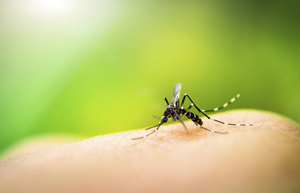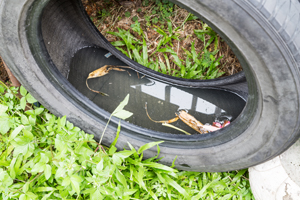Mosquitoes Carry Serious Diseases

Yellow Fever, Dengue Fever, West Nile Virus, Zika Virus and Malaria - these are just a few.
You Can Help Prevent Diseases from Spreading!
Help reduce mosquito breeding habitats by eliminating standing water in and around your property. The life cycle of a mosquito is approximately seven days. They can breed in small amounts of water that collect in containers like bottles, cans, cups, buckets, hoses, planters, drains and in plants such as bromeliads. Regularly dump anything that holds water. If it's too large to be dumped, apply larvicide to keep the mosquito larvae from developing. Some mosquitoes, such as the variety that carries Dengue and Yellow Fever, breed indoors and outdoors and bite any time of the day or night.

Recommended Larvicide
Larvicide products last between seven and 180 days, depending upon the product type. They're available online, at local home improvement and hardware stores, and wherever pest control products are sold. Check the product labels for specifics regarding the type of habitat for which they are most suitable, and the duration of effectiveness. Products are in the form of either briquettes, tablets or granules that contain either Spinosad or Bacillus thuringiensis subspecies israelensis
(Bti), or insect growth regulators that are safe for pets, birds, beneficial insects and the ecosystem. Some brand names of Spinosad or Bti larvicides are Natular G, DT and XRT, Fourstar, MosquitoDunks®, Mosquito Bits® and Bonide Mosquito Beater®.
If you need help identifying breeding habitats around your property, please contact the Broward County Mosquito Control Division at 954-765-4062.
Practice Personal Mosquito Prevention when Outdoors
Residents are encouraged to wear long-sleeved shirts and pants that cover most of the skin during peak mosquito activity period to reduce exposure to mosquito bites. In addition, residents are advised to use EPA-registered mosquito/tick repellents such as products containing DEET or other EPA registered active ingredients. You can find a list here.
Broward Takes the “Bite” Out of Mosquito Season
Spring and summer brings frequent, heavy rain to Broward County and rain brings mosquitoes. Mosquitoes are not only annoying, they can be a public health issue. The County Biologist regularly traps mosquitos, separates them by species and detects any potential viruses. Findings will determine the chemical application to be used and the type of treatment required.
Three Ways to Request Service:
What to Expect:
A Mosquito Control Inspector may contact you to perform a Home Inspection at your residence. It is important that you provide accurate contact information when filling out the online mosquito service request. During the Home Inspection, our inspectors will identify areas where mosquitoes may be breeding on your property. Standing water sources where mosquitoes breed will be tipped, tossed or treated with insecticides. Inspectors may choose to set a mosquito trap at your residence. It is important for us to know what species of mosquitoes are causing the problem so that we may select the best course of action. Please note we do not service for sandflies, white fly, no-see-ums or any other pest insect besides mosquitoes. We compile mosquito surveillance data across the county and perform adulticiding and larviciding as needed.
Did you know that?
- There are over 3500 species of mosquito worldwide.
- The mosquito is responsible for more deaths globally each year than any other animal (including humans).
- Only female mosquitoes bite, using the protein rich bloodmeal to develop a clutch of eggs.
- A single adult female mosquito can lay up to 500 eggs during her lifetime.
